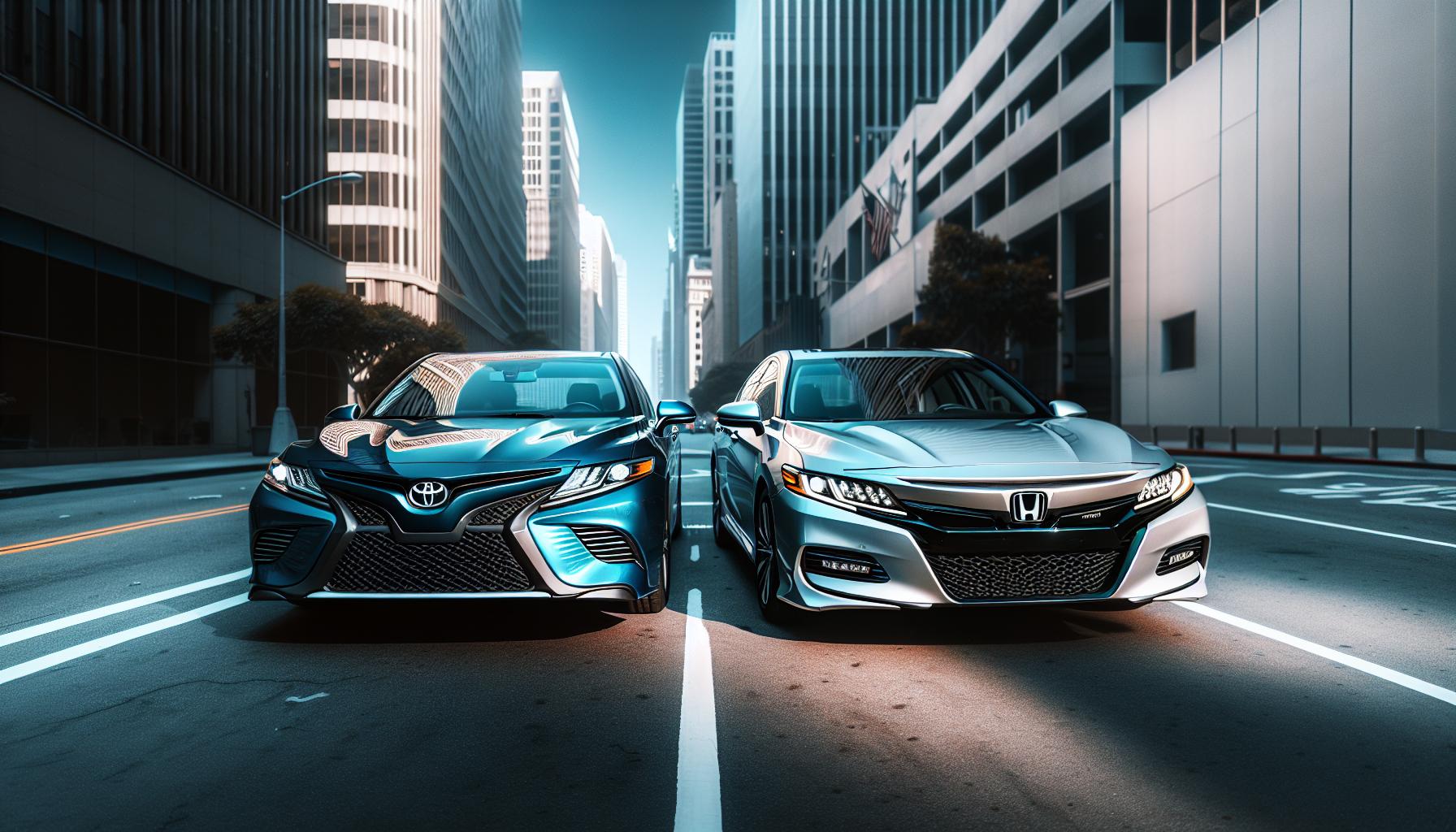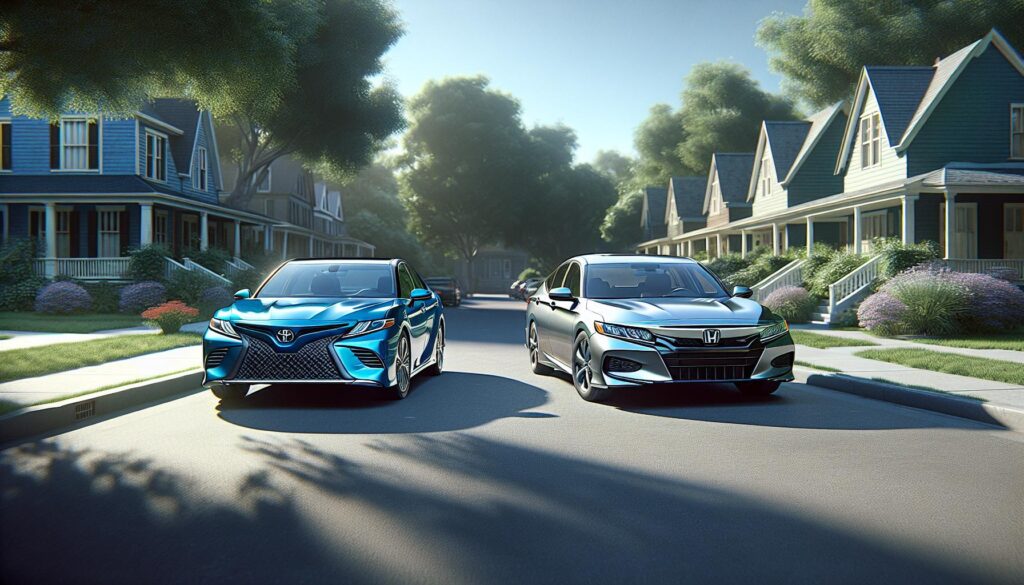When it comes to choosing a reliable midsize sedan, the Toyota Camry and Honda Accord often top the list. Both cars have earned a reputation for their dependability, comfort, and impressive features. But which one truly stands out in the competitive automotive landscape?
Car enthusiasts and everyday drivers alike frequently debate the merits of these two giants. The Camry boasts a sporty design and a reputation for longevity, while the Accord is celebrated for its spacious interior and innovative technology. In this article, we’ll dive into the key differences and similarities between the Camry and Accord to help drivers make an informed decision.
Which is Better Camry or Accord
The Toyota Camry and Honda Accord serve as benchmarks in the midsize sedan market. Each vehicle offers distinct features and benefits appealing to various driver preferences.
Design and Style
- Camry: Features a sleek, sporty design, emphasizing aerodynamics and modern aesthetics. The front grille and LED headlamps enhance its aggressive stance.
- Accord: Boasts a more elegant silhouette with a focus on sophistication. Its longer wheelbase contributes to a balanced, premium appearance.
Interior Space and Comfort
- Camry: Provides a comfortable cabin with supportive seating for five. The materials used are high-quality, and the layout is user-friendly.
- Accord: Delivers generous interior space, particularly in the rear seat area. Cargo space is ample, allowing for practical storage solutions.
Performance
- Camry: Offers a choice of engines, including a robust V6 option. The handling is responsive, making it enjoyable to drive.
- Accord: Features efficient powertrains, with a strong emphasis on fuel economy. The driving dynamics maintain a smooth, composed ride.
Technology and Features
- Camry: Incorporates the latest infotainment systems, including a touchscreen with smartphone integration. Safety features are comprehensive and highly rated.
- Accord: Stands out with advanced technology offerings and intuitive interfaces. It includes a range of driver-assistance features designed to enhance safety.
- Camry: Known for its long-term reliability, often ranking high in consumer satisfaction. Resale values remain strong, underscoring its value proposition.
- Accord: Similar reputation for dependability, with consistently high ratings in reliability surveys. Its resale value also reflects its quality and appeal.
These attributes underscore why both models rank highly among midsize sedans, influenced by factors like design, performance, and technology.
Design and Comfort


The design and comfort of the Toyota Camry and Honda Accord play crucial roles in their overall appeal. Both midsize sedans offer distinct aesthetics and interior experiences to meet various preferences.
Exterior Design Comparison
Camry’s exterior showcases a sporty silhouette with sharp lines and aggressive styling. It features a bold front grille and LED headlights that enhance its modern look. Accord offers an elegant design characterized by a flowing roofline and a refined front fascia. Its distinctive rear end and sleek profile contribute to a sophisticated appearance. Both vehicles come in multiple trims, allowing for personalized styling options with different wheel designs, color choices, and available accessories.
Interior Features and Comfort
Camry’s interior provides a driver-focused layout with high-quality materials and available leather seating. It offers modern amenities like dual-zone climate control and a spacious rear seat for passengers. Accord excels in interior space, featuring expansive legroom and headroom, particularly in the back seat. Premium materials and a minimalist design create a comfortable ambiance. Both vehicles incorporate advanced infotainment systems for an intuitive driving experience while emphasizing passenger comfort through noise insulation and supportive seating.
Performance and Efficiency
Performance and efficiency are crucial factors in choosing between the Toyota Camry and Honda Accord. Each model offers distinct advantages in terms of engine options and fuel economy, appealing to different driving preferences.
Engine Options
The Toyota Camry offers a range of engine choices, including a 2.5-liter four-cylinder engine producing 203 horsepower and a more powerful 3.5-liter V6 engine generating 301 horsepower. These options deliver a balance of power and responsiveness, enhancing the sporty driving experience. The Honda Accord features a similar range with a 1.5-liter turbocharged four-cylinder engine providing 192 horsepower and a 2.0-liter turbocharged engine producing 252 horsepower. Both sedans cater to diverse performance needs, allowing drivers to select an engine that best suits their style.
Fuel Economy Ratings
Fuel efficiency remains a key differentiator between the Camry and Accord. The Camry’s base four-cylinder engine yields up to 28 mpg in the city and 39 mpg on the highway. The V6 version delivers respectable efficiency too, achieving around 22 mpg in the city and 33 mpg on the highway. In contrast, the Honda Accord’s 1.5-liter engine achieves impressive fuel economy ratings of 30 mpg in the city and 38 mpg on the highway, while the 2.0-liter engine offers 22 mpg in the city and 32 mpg on the highway. These fuel economy figures highlight the Accord’s emphasis on efficiency, appealing to drivers prioritizing long-term savings at the pump.
Technology and Safety
Both the Toyota Camry and Honda Accord incorporate advanced technology and safety features that enhance their appeal in the midsize sedan segment. They offer a range of infotainment systems and robust safety options designed to improve the driving experience.
Infotainment Systems
The Camry’s infotainment system features a straightforward interface with a standard 7-inch touchscreen, upgradeable to a 9-inch display. It supports Apple CarPlay and Android Auto, allowing seamless smartphone integration. The Accord boasts a user-friendly 7-inch touchscreen, with an optional 12.3-inch display available on higher trims. Additionally, it offers wireless smartphone integration, providing increased convenience for drivers. Both vehicles include available premium audio systems, enhancing sound quality for passengers.
Safety Features
Safety remains a top priority in both models. The Camry includes Toyota Safety Sense, featuring adaptive cruise control, lane departure warning, and automatic emergency braking as standard. The Accord offers Honda Sensing, which provides similar functionalities, including collision mitigation braking and road departure mitigation. Both vehicles achieve high safety ratings from the National Highway Traffic Safety Administration (NHTSA) and the Insurance Institute for Highway Safety (IIHS), ensuring peace of mind for drivers and passengers.
Driving Experience
Driving experience significantly impacts the overall enjoyment of a vehicle. Both the Toyota Camry and Honda Accord deliver distinctive experiences that cater to different preferences.
Handling and Ride Quality
Handling and ride quality define how a vehicle responds to driver input and road conditions. The Camry’s sporty suspension enhances responsiveness, providing a more engaging driving experience. Its nimble handling allows for quick maneuvers in tight spaces, making it suitable for urban driving. In contrast, the Accord focuses on comfort, featuring a softer suspension that absorbs bumps effectively. This design promotes a smoother ride, ideal for long-distance travel, allowing passengers to enjoy a relaxing journey over various terrains.
Noise and Vibration Levels
Noise and vibration levels contribute to overall driving comfort. The Camry utilizes sound-deadening materials and an aerodynamic design, resulting in a quieter cabin at high speeds. It minimizes road noise and vibrations, enhancing the experience for both driver and passengers. The Accord, equipped with similar technology, excels in maintaining a serene environment. Its well-engineered structure helps reduce external noise, offering a peaceful driving experience. Both models create a refined atmosphere, ensuring that noise and vibration levels stay low for an enjoyable ride.
Price and Value
Analyzing price and value reveals key distinctions between the Toyota Camry and Honda Accord. Both vehicles offer competitive pricing and sound long-term value.
Base Model Comparison
The base model price for the Toyota Camry starts around $26,000, while the Honda Accord’s base model is approximately $27,000. The Camry’s base offering includes a 2.5-liter four-cylinder engine, LED headlights, and Toyota Safety Sense. In contrast, the Accord presents a 1.5-liter turbocharged engine, Honda Sensing, and a spacious interior. Buyers should consider these starting prices alongside feature sets when evaluating overall value.
Cost of Ownership
Cost of ownership plays a crucial role in the decision-making process. The Camry typically incurs lower maintenance costs, averaging $400 annually, due to Toyota’s robust reliability reputation. The Accord features average maintenance costs around $450 per year. Fuel economy significantly impacts overall costs; the Camry achieves an estimated 28 mpg city and 39 mpg highway, while the Accord offers around 30 mpg city and 38 mpg highway. Resale value for both models remains strong, with the Camry averaging 60% of its original value after five years and the Accord at about 58%. This strong resale value highlights the financial sense of investing in either vehicle.
Choosing between the Toyota Camry and Honda Accord ultimately comes down to personal preference and priorities. The Camry appeals to those seeking a sporty design and responsive handling while still offering reliability and comfort. On the other hand, the Accord shines with its spacious interior and advanced technology, making it an excellent choice for families and tech enthusiasts alike.
Both vehicles provide exceptional value with strong resale potential and low maintenance costs. Whether a driver prioritizes performance or efficiency both models deliver impressive results. In the end, a test drive of each sedan will help clarify which fits best with individual needs and lifestyle.
